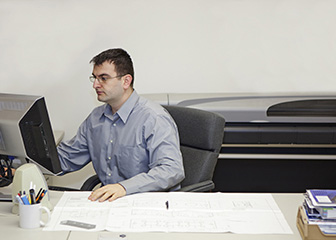
Mechanical engineers analyze problems to see how a mechanical device might help to solve them.
Mechanical engineers need a bachelor’s degree. A graduate degree is typically needed to be hired or promoted into managerial positions. Mechanical engineers who sell services publicly must be licensed in all states and the District of Columbia.
Education
Nearly all entry-level mechanical engineering jobs require a bachelor's degree in mechanical engineering.
Mechanical engineering degree programs usually include courses in mathematics and life and physical sciences, as well as engineering and design courses. The programs typically last 4 years, but many students take between 4 and 5 years to earn a degree. A mechanical engineering degree program may emphasize internships and co-ops to prepare students for work in industry. Theory is often another main focus, in order to prepare students for graduate-level work.
A few engineering schools allow students who spend 3 years in a liberal arts college studying pre-engineering subjects and 2 years in an engineering school studying core subjects to receive a bachelor's degree from each school.
Some colleges and universities offer 5-year programs that allow students to obtain both a bachelor’s and a master’s degree. Some 5- or even 6-year cooperative plans combine classroom study with practical work, enabling students to gain valuable experience and earn money to finance part of their education.
Many engineering programs are accredited by ABET (formerly the Accreditation Board for Engineering and Technology). Some employers prefer students from an accredited program. A degree from an ABET accredited program is usually necessary to become a licensed professional engineer.
Important Qualities
Creativity. Because mechanical engineers convert scientific concepts into real-world applications, they design and build sometimes complex or unique pieces of equipment and machinery. A creative mind is essential for this kind of work.
Listening skills. Mechanical engineers often work on projects with other engineers and professionals, such as architects. They must listen to and analyze different approaches to the task at hand.
Math skills. Mechanical engineers use the principals of calculus, trigonometry, and other advanced topics in mathematics for analysis, design, and troubleshooting in their work.
Mechanical skills. A background in mechanics, such as experience gained through a co-op in college or work as a mechanic, helps mechanical engineers develop skills that are useful in solving real-world problems. Such a background allows engineers to visualize basic engineering concepts and mechanical processes more easily. Also important is an ability to learn and use new tools and equipment.
Problem-solving skills. Mechanical engineers take scientific discoveries and seek to make them into products that would be useful to people, companies, and governments.
Licenses
All 50 states and the District of Columbia require licensure for engineers who offer their services directly to the public. Licensed mechanical engineers are designated as professional engineers (PEs). The PE license generally requires a degree from an engineering program accredited by ABET, Inc., 4 years of relevant work experience, and passing a state exam.
Recent graduates can start the licensing process by taking the exam in two stages. They can take the Fundamentals of Engineering (FE) exam right after graduation. Engineers who pass this exam commonly are called engineers in training (EITs) or engineer interns (EIs). After gaining experience, EITs can take a second exam, called the Principles and Practice of Engineering exam, for full licensure as a PE.
Several states require continuing education to renew the license every year. Most states recognize licensure from other states, as long as the way that the initial license was obtained meets or exceeds the recognizing state’s own licensure requirements.
Certification
Professional organizations, such as the American Society of Mechanical Engineers, offer a variety of certification programs for engineers to demonstrate competency in specific fields of mechanical engineering.
Advancement
Graduate training is essential for engineering faculty positions in higher education, as well as for some research-and-development programs. Many experienced mechanical engineers get graduate degrees in engineering or business administration to learn new technology and broaden their education. Many become administrators or managers after obtaining a graduate degree.













